
This OER textbook has been developed to support English Composition and Rhetoric courses at rural Arizona community colleges.
- Subject:
- Composition and Rhetoric
- English Language Arts
- Material Type:
- Textbook
- Author:
- Erik Wilbur
- Date Added:
- 05/17/2023

This OER textbook has been developed to support English Composition and Rhetoric courses at rural Arizona community colleges.
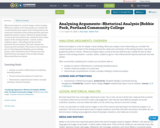
Rhetorical analysis is a tool for deeper critical reading. When you analyze a text rhetorically, you consider the overall situation and context of the writing and how the needs and constraints of the writing situation may have guided the author’s choices. Rhetorical analysis helps us look at the text itself but also outside the text at other aspects of the writing situation—context, author, audience, genre—that influenced the way this particular text was written.
This unit contains two lessons and two activities.
This resource was created as part of a Developmental Reading course redesign project, with contributions from Theresa Love and David Pontious and support from an Open Oregon Educational Resources grant.
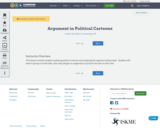
This lesson involves students exploring political cartoons and analyzing the argument being made. Students will work in groups to build skills, then they will get an assignment to practice the skill on their own.

COM-101, titled "Communication Analysis," is a comprehensive 3-credit course designed to explore the intricacies of communication, focusing on the analysis of verbal and visual messages. This course is tailored for students who have completed ENG 101 and are concurrently enrolled in ENG 102 or its honors equivalent. It delves into the commonalities and differences across various communication subdisciplines, emphasizing critical inquiry and intensive writing. With a general education designation in Social & Behavioral Sciences, it also addresses special topics such as Ethnic, Race, and Gender Awareness, and Contemporary Global and International Awareness.Structured into fifteen modules, the course covers a wide range of topics from the basics of human communication and the history of communication studies to specialized areas like gender and organizational communication. Each module combines theoretical and practical elements, helping students to not only understand but also apply communication theories to real-life situations. Assessments include exams, discussions, and significant writing projects aimed at enhancing critical listening, thinking, and interacting skills.
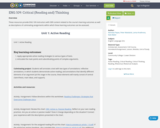
These resources provide ENG 109 instructors with OER content related to the course's learning outcomes as well as descriptions of culminating assignments within which these learning outcomes can be assessed.
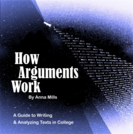
How Arguments Work takes students through the techniques they will need to respond to readings and make sophisticated arguments in any college class. This is a practical guide to argumentation with strategies and templates for the kinds of assignments students will commonly encounter. It covers rhetorical concepts in everyday language and explores how arguments can build trust and move readers.
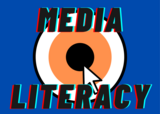
As an introduction to Media Literacy, this lesson covers topics ranging from rhetorical theory, philosophy, and history to illuminate the interconnected complications of media in the modern world. Supplemental resources are woven into the lesson in the form of hyperlink text, images, and embedded videos. The ultimate goal of this lesson resource is to inform grade-aged learners about the subject complexity of media literacy and equip them with the most basic tools to properly understand and engage with social media and media in general. Crash Course, a free supplemental learning company is a commonly referenced external tool within the lesson as their expanding topic verity offers well-researched additive content for digital learning environments.

As an introduction to Media Literacy, this lesson covers topics ranging from rhetorical theory, philosophy, and history to illuminate the interconnected complications of media in the modern world. Supplemental resources are woven into the lesson in the form of hyperlink text, images, and embedded videos. The ultimate goal of this lesson resource is to inform grade-aged learners about the subject complexity of media literacy and equip them with the most basic tools to properly understand and engage with social media and media in general. Crash Course, a free supplemental learning company is a commonly referenced external tool within the lesson as their expanding topic verity offers well-researched additive content for digital learning environments.

This resource walks French learners through how to write a "dissertation dialectique", one of the staples of argumentative French essays. It includes an original example by a freshly graduated high schooler about ecology, a controversial and current issue that lands itself well to the exercise. This resource is designed for Advanced learners.

A freshman composition textbook used by the English Department of Virginia Western Community College (VWCC) in Roanoke, Virginia. It aligns with ENG 111, the standard first-year composition course in the Virginia Community College System (VCCS). The ten chapter headings are:
1. Chapter 1 - Critical Reading
2. Chapter 2 - Rhetorical Analysis
3. Chapter 3 - Argument
4. Chapter 4 - The Writing Process
5. Chapter 5 - Rhetorical Modes
6. Chapter 6 - Finding and Using Outside Sources
7. Chapter 7 - How and Why to Cite
8. Chapter 8 - Writing Basics: What Makes a Good Sentence?
9. Chapter 9 - Punctuation
10. Chapter 10 - Working With Words: Which Word is Right?
This book was created by the English faculty and librarians of VWCC using Creative Commons -licensed materials and original contributions.

This media literacy unit was designed and piloted with junior English classes at the start of the school year. Activities can easily be adapted to suit secondary students at various levels. Within the unit, students analyze corporate logos, corporate advertising, movie trailers and stereotypes found in media related to Native American culture. Within the unit, students also learn how to consider the ways in which media appeals to ethos, pathose and logos and how to identify the tone of a piece of media.
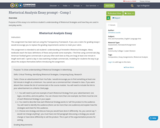
Purpose of this essay is to reinforce student's understanding of Rhetorical Strategies and how they are used in everyday works.
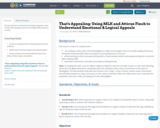
An introduction to emotional and logical appeals, using To Kill a Mockingbird and the Civil Rights Movement as context.

With the adoption of the Common Core State Standards, The Next Generation Science Standards, and the C3 Framework for Social Studies State Standards, many middle and high schools require their content teachers to teach writing within their discipline area, often resulting in role confusion, anxiety, and resistance.“Teaching writing” – the job of the ELA faculty - is confused with “Teaching How to Write like a Historian, a Scientist, a Mathematician . . .” - the job of the content faculty. Because content faculty are not usually trained in composition pedagogy, they may avoid writing instruction or worse – actually damage young writers by offering misguided instruction in mechanics and grammar.Content faculty may be familiar with the writing conventions of their particular discipline. With raised awareness of their expertise and by identifying the rhetorical characteristics of their subject area, content faculty can learn instructional skills to support writing across the curriculum.As a K-12 informational resource, the librarian holds a key position to raise awareness, reduce role confusion, provide instructional references, and improve writing school-wide. This module prepares pre-service librarians to understand and provide information to rectify the confusion of writing instruction across the secondary curriculum.
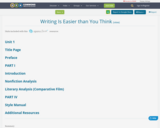
This is an in-process draft of an English composition textbook.